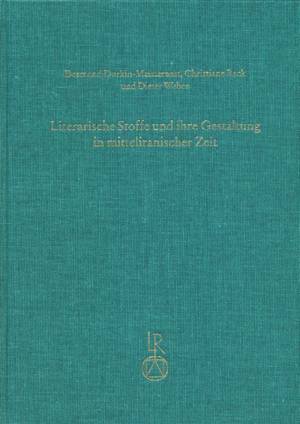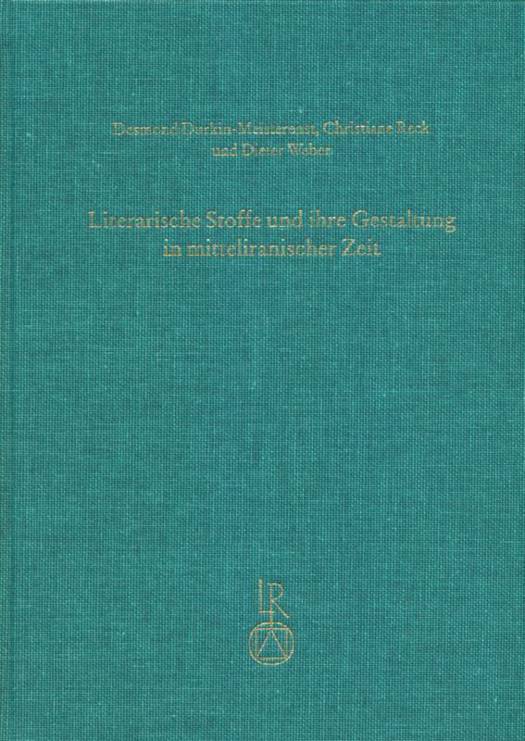
- Retrait gratuit dans votre magasin Club
- 7.000.000 titres dans notre catalogue
- Payer en toute sécurité
- Toujours un magasin près de chez vous
- Retrait gratuit dans votre magasin Club
- 7.000.0000 titres dans notre catalogue
- Payer en toute sécurité
- Toujours un magasin près de chez vous
Literarische Stoffe Und Ihre Gestaltung in Mitteliranischer Zeit
Kolloquium Anlasslich Des 70. Geburtstages Von Werner Sundermann
191,95 €
+ 383 points
Description
English summary: This volume contains edited versions of the contributions to a colloquium held at the Berlin Brandenburg Academy of Sciences and Humanities on the 30th and 31st of March 2006 with the title: 'Literary materials and their form in the Middle Iranian period. Colloquium in honour of the 70th birthday of Prof. Dr. Werner Sundermann'. The colloquium was dedicated to a topic localised in the Sasanian Empire and on the Silk Road and concentrating on the first millennium CE. The contributions deal in particular with the re-occurrence of individual motifs and concepts in the various strands of the literatures in the Middle Iranian languages. Besides selected aspects of the tradition of the Avesta, of learned women in Middle Persian legal discourse, of the Alexander novel in Pahlavi literature, and of Buddhist texts such as the Saka 'Book of Zambasta' and the Sogdian Vessantarajataka the main focus is on the dispersal of narrative works by the Manichaeans through Middle Iranian into Old Turkish literature und even as far as China. Complementing this are contributions on the Aramaic and Mandaic traditions and the first comprehensive edition of the much discussed Manichaean Bactrian fragment. A possible Iranian-Celtic literary influence is also discussed.The contributions are in English (11), German (9) and French (1). German description: Der vorliegende Band enthalt die uberarbeiteten Beitrage des am 30. und 31. Marz 2006 in der Berlin-Brandenburgischen Akademie der Wissenschaften in Berlin gehaltenen Colloqiums mit dem Titel "Literarische Stoffe und ihre Gestaltung in mitteliranischer Zeit. Ehrencolloqium anlasslich des 70. Geburtstages von Prof. Dr. Werner Sundermann". Das Colloquium widmete sich einem Thema, das sich raumlich auf das Sasanidenreich und die Seidenstrasse und zeitlich auf das erste Millennium n. Chr. konzentriert. Die Beitrage behandeln vor allem die Wiederkehr von einzelnen Motiven und Begriffen in den verschiedenen Strangen der Literaturen in den mitteliranischen Sprachen. Neben ausgewahlten Aspekten zur Uberlieferung im Avesta, zu gelehrten Frauen im mittelpersischen Rechtsdiskurs und zum Alexanderroman in der Pahlaviliteratur und zu buddhistischen Texten wie dem sakischen "Book of Zambasta" und dem sogdischen Vessantarajataka steht ganz besonders die Tradierung von Erzahlgut durch die Manichaer uber die mitteliranischen Literaturen in die altturkische Literatur hinein und bis nach China im Mittelpunkt. Dies wird komplettiert durch Beitrage zur aramaischen und mandaischen Uberlieferung und durch eine umfassende Erstedition des vieldiskutierten baktrischen manichaischen Fragmentes. Eine mogliche iranisch-keltische literarische Beeinflussung wird auch erortert.Die Beitrage sind in Englisch (11), Deutsch (9) und Franzosisch (1) verfasst.
Spécifications
Parties prenantes
- Editeur:
Contenu
- Nombre de pages :
- 408
- Langue:
- Allemand
- Collection :
- Tome:
- n° 31
Caractéristiques
- EAN:
- 9783895006715
- Date de parution :
- 01-12-09
- Format:
- Livre relié
- Format numérique:
- Genaaid
- Dimensions :
- 170 mm x 240 mm
- Poids :
- 829 g

Les avis
Nous publions uniquement les avis qui respectent les conditions requises. Consultez nos conditions pour les avis.





